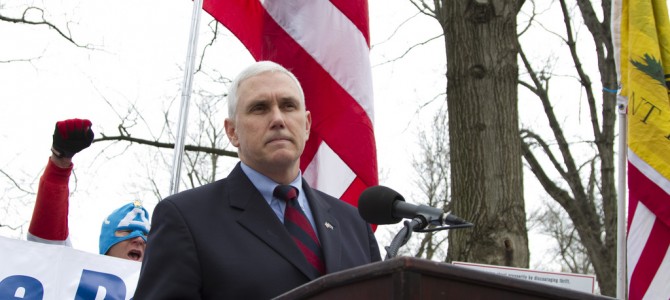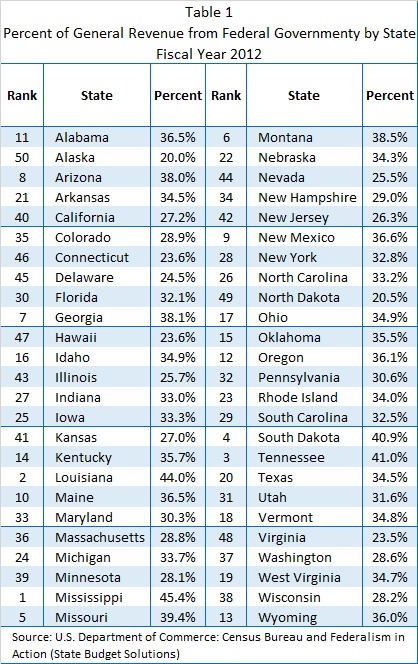
Politicians and policy makers alike often disregard basic economic principles when it comes to health care. The current debate about Medicaid expansion is especially lacking in this regard.
In Indiana, Gov. Mike Pence has asked the federal government to expand Medicaid under the auspices of his “Healthy Indiana 2.0” (HIP 2.0). The promise of federal money seems to be a convincing-enough argument for those concerned about the financial stability of Medicaid expansion. But according to recent analysis by State Budget Solution’s Federalism in Action project, HIP 2.0 would have a devastating impact on Indiana’s economy by shrinking the private sector and, in turn, eliminating jobs and lowering income.
The report does much more than remind us “there is no such thing as a free lunch.” Unlike the private sector, government is a “taker” and not a “maker,” meaning that new spending by the feds in Indiana cannot expand the economy—it can only expand Medicaid rolls. The private sector, however, can expand the economy by creating more jobs and providing more income to individuals and families.
The problem with greater government spending is that it crowds out potential growth in the private sector. By our calculations, the cost of accepting federal funds for Medicaid expansion amounts to $9.5 billion for the Hoosier State over the first three to five years[1] that will have to be paid somehow—either by shrinking the labor force—as many as 176,928 jobs lost—or reducing private sector income per household—as much as $3,721per household. In reality, Indiana will wind up with a terrible mix of both.
These increased costs for Indiana will prevent the state from ever being able to carry out its vision for the most vulnerable residents. And worse, it will have a ripple effect that will disrupt the private sector significantly.
The Wrong Kind of Federalism
Over the last few decades, the federal government has massively expanded its reach into state governance under the banner of “cooperative federalism.” This occurs when Congress passes a law but recognizes that it does cannot implement the law on its own. To accomplish its objectives, Washington entices states with federal dollars to implement and enforce the statute. Before the U.S. Supreme Court’s decision in 2012 ruling that Medicaid expansion was optional, the federal government would have required participation from states or withheld all Medicaid funding from them.
For more federal funding, states will do what the federal government wishes, while expanding their budgets and increasing their dependence on Washington, DC.
Pence’s Disappointing Inconsistency
What makes all of this surprising and disappointing to supporters of robust federalism is that Mike Pence is no stranger to the concept. Many have heralded Pence as a champion of policies that encourage local control. As a member of Congress, he voted against Medicare Part D and the No Child Left Behind—two pieces of legislation that have significantly increased the role of the federal government in affairs traditionally reserved to the states. Just last year, he issued an executive order to create a new office in Indiana, the Office of State-Based Initiatives, to evaluate federal funds coming into the state and to reject those that would unduly increase dependence on Washington or restrict Indiana’s autonomy.
Pence claims that HIP 2.0 will provide Hoosiers with a state-based solution to provide for the needs of the most vulnerable. However, by doing so under Obamacare’s Medicaid expansion, the state will also accept $2.9 billion from the federal government. According to our research, federal funds already make up one-third of the Indiana state budget. Given Washington’s continued string of broken promises, can Washington really be trusted to keep its funding promises?
 Too many states have already been enticed by federal money for Medicaid expansion. Even for otherwise principled lawmakers, the political ramifications for “leaving money on the table” seem far too great a cost to their states. What many politicians fail to properly analyze or recognize, however, is the long-term cost of accepting those federal dollars and what it means for their states.
Too many states have already been enticed by federal money for Medicaid expansion. Even for otherwise principled lawmakers, the political ramifications for “leaving money on the table” seem far too great a cost to their states. What many politicians fail to properly analyze or recognize, however, is the long-term cost of accepting those federal dollars and what it means for their states.
Pence has historically remained one of those rare elected officials who did understand the long-term consequences of doing business with the federal government. He has fundamentally opposed measures that would increase federal overreach and restrict state sovereignty. That is why his decision to expand Medicaid in Indiana is all the more puzzling.
Ultimately, the approval of HIP 2.0 will be a devastating blow to Indiana’s autonomy and the state’s ability to make local decisions. It will prevent the Hoosier State from effectively administering local control over its Medicaid program and, worse, HIP 2.0 significantly increases its dependence on the federal government.
Pence should reflect back on his policy decisions in the not so distant past. Healthy Indiana 2.0 is a step in the wrong direction for Indiana and for federalism.
J. Scott Moody is the CEO of State Budget Solutions, a non-partisan, nonprofit, national public policy organization with the mission to change the way state and local governments do business.
[1] The $9.5 billion cost to the Indiana economy represents a decrease in the long-run growth rate, which will happen over a several years—at least a 3 to 5 year period. So, for example, suppose Indiana’s economy was going to grow to $150 billion in 2019 from $100 billion today. Our study shows that, with Medicaid expansion, Indiana’s economy will only grow to $140.5 billion, for a permanent annual loss of $9.5 billion in 2019 and beyond.









